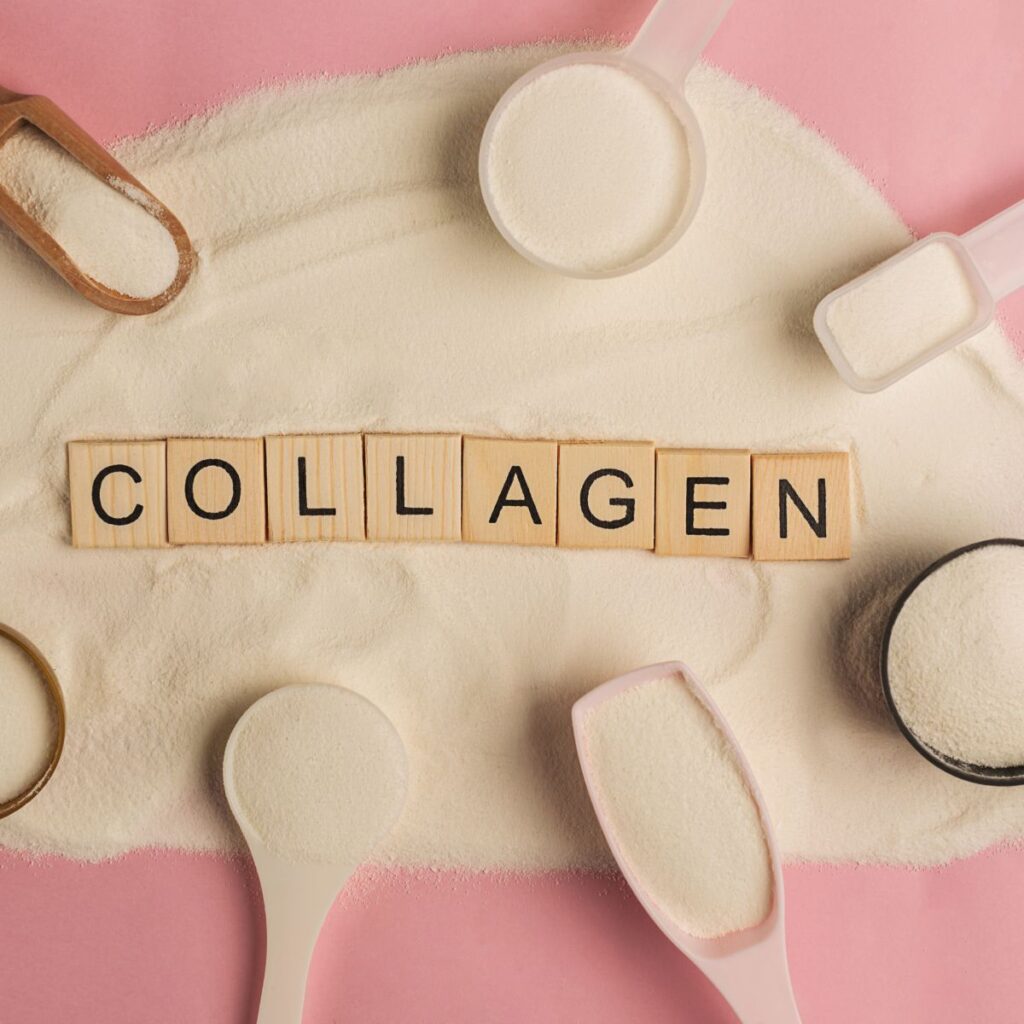Blog
Best Collagen Supplement for Skin, Hair & Joints: Full Guide
Collagen is the most abundant protein in the human body, making up nearly one-third of total body protein. Often referred to as the “biological glue,” collagen holds cells together, providing structure and strength from head to toe. However, as we age, this essential glue begins to break down—explaining the emergence of sagging skin, wrinkles, and weaker joints and bones.
What Is Collagen and Why Is It Important?
Collagen gives the skin its firmness and elasticity, supports joint and bone health, strengthens gut lining and blood vessels, and is essential for overall structural integrity.
It’s primarily made up of three amino acids: glycine, proline, and hydroxyproline, which together form a triple-helix structure, much like a tightly braided rope—giving collagen its tensile strength.
But starting around age 25, our natural collagen production gradually declines. This decline accelerates with age and is worsened by environmental factors like sun exposure and poor nutrition, affecting both appearance and health.
Main Types of Collagen in the Body

There are more than 20 types of collagen, but the most important and biologically relevant for human health include
Type I Collagen
- Most abundant in the body.
- Found in skin, bones, connective tissue, and intestines.
- Crucial for skin elasticity, bone strength, and gut integrity.
If you need more details about a personalized, tailored full SIBO/IBS gut healing protocol, follow the link below and subscribe:
Type II Collagen
- Found primarily in cartilage.
- Essential for joint health and mobility.
Type III Collagen
- Present in muscles and artery walls.
- Supports cardiovascular health and muscular structure.
Bovine collagen is the most complete, containing Types I, II, and III.
Marine collagen provides Types I and III.
Chicken collagen is rich in Type II only.
Top Benefits of Collagen for Health
- Improves skin elasticity and reduces signs of aging.
- Strengthens hair and promotes growth.
- Supports nail health and prevents breakage.
- Protects joints and reduces pain.
- Heals gut lining, helping with leaky gut and IBS.
- Strengthens bones, preventing osteoporosis.
- Improves blood vessel health, reducing risk of clots and vascular issues.
What Causes Collagen Breakdown?
Certain lifestyle habits accelerate collagen degradation:
- Excess sugar intake promotes chronic inflammation that weakens collagen fibers.
- Processed foods (fast food, fried snacks) disrupt collagen synthesis.
- Smoking, hookah, and alcohol introduce toxins that speed up aging.
- Sun exposure without SPF rapidly breaks down skin collagen.
Use a broad-spectrum sunscreen SPF 50+ daily.
Can You Get Collagen from Food?
Yes! While around 50% of collagen is synthesized by the body, the rest must come from your diet. These are the best natural and affordable collagen sources:
1) Bone Broth
- Rich in gelatin, a broken-down form of collagen.
- Made by slow-cooking bones (knuckles, tails, wings) for 12–24 hours with a tablespoon of organic apple cider vinegar.
- Can be frozen into cubes for up to 3 months.
2) Chicken Skin, Neck & Wings
- Excellent source of Type II collagen.
3) Eggshell
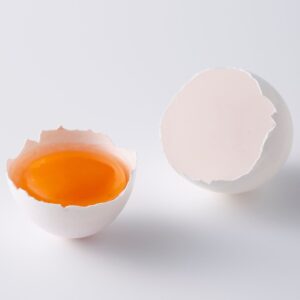
- Boil, dry, and grind into powder to add to soups or smoothies.
4) Unflavored Gelatin
- Use it to make homemade collagen gummies with fruit and natural sweeteners.
5) Organ Meats (Liver, Kidneys)
- Packed with minerals and amino acids that support collagen synthesis.
6) Egg Whites
- Contain high levels of glycine and proline, both essential for collagen’s natural synthesis.
7) Fish and Seafood (with skin & bones)
- Rich in marine collagen, especially when skin and bones are included.
Key Nutrients That Stimulate Collagen Production
To naturally increase collagen levels, prioritize these collagen-boosting nutrients:
Vitamin C
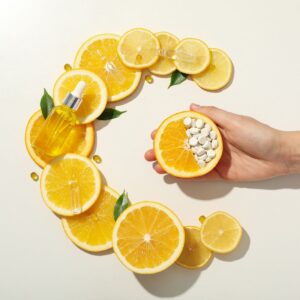
- Essential cofactor in collagen synthesis.
- Found in: citrus fruits, bell peppers, strawberries, and kiwi.
- Eat raw for best absorption—heat destroys vitamin C.
Essential Amino Acids—Building Blocks for Collagen Synthesis
- Glycine: in gelatin and bone broth.
- Proline: in egg whites and soybeans.
- Lysine: in quinoa and legumes.
Zinc and Copper
- Critical for enzyme function in collagen formation.
- Sources: pumpkin seeds, lentils, almonds, mushrooms.
Antioxidants
- Neutralize free radicals that damage collagen.
- Best sources: green tea, blueberries, dark cacao, and turmeric.
Hydration
- Helps transport nutrients to skin cells.
- Don’t rely on water alone—try hibiscus or nettle tea for added skin benefits.
Exercise & Sleep
- Strength training boosts growth hormone, which promotes collagen.
- Quality sleep supports cell regeneration and collagen repair.
Should You Take a Collagen Supplement?
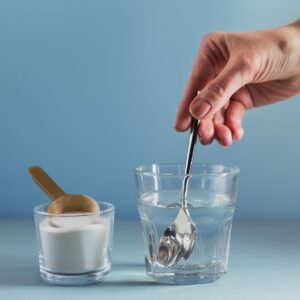
While supplements aren’t the only solution, oral collagen peptides can support skin, hair, joint, and gut health. But not all collagen powders are created equal. Look for:
- Type: Bovine collagen (includes Types I, II, and III).
- Source: Organic, grass-fed, hormone- and antibiotic-free, and heavy metal-tested.
- Form: Hydrolyzed collagen peptides (the only form your body can absorb).
- Dosage: Minimum 20 grams per serving.
- Format: Unflavored powder (mix with coffee, tea, or smoothies).
- Timing: Take once daily after a vitamin C-rich meal.
Skincare Products & Daily Routine to Boost Collagen Naturally
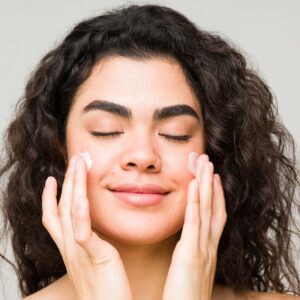
Morning Routine
- SPF 50 Sunscreen
- CoQ10 Cream (powerful in boosting natural skin-collagen synthesis)
- Vitamin C Serum
Night Routine
- Retinol Cream
- Peptide-rich Serum (e.g., ceramides)
Optional Add-ons
- Microneedling (weekly): Enhances collagen via controlled skin microtrauma. Ensure proper sanitation.
- Avoid topical collagen creams—they moisturize but do not penetrate deep enough to rebuild collagen.
Final Thoughts: Collagen Is More Than a Beauty Trend
Collagen isn’t just another wellness trend—it’s a foundational element for both your inner health and outer appearance. Focus on natural food sources, a healthy lifestyle, and only science-backed collagen supplements for optimal results. Don’t wait for the signs of aging to take action—start supporting your collagen today.
If you are looking for more details about collagen benefits, how to choose the best collagen supplements, and more, watch the full episode below on Dr. Fajer AlJumairi’s YouTube channel:

